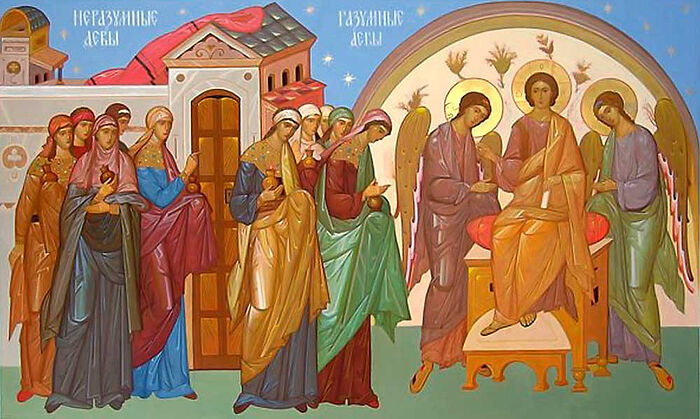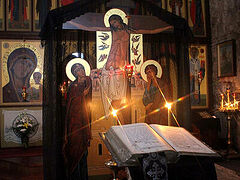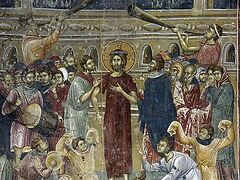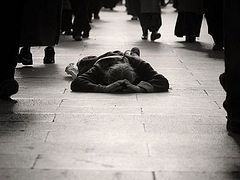You have just heard, beloved, a moving hymn: “Lo, the bridegroom cometh at midnight,” which is sung at matins in the first three days of Holy Week. To make it clear to everyone and to bring the desired benefit to everyone, let me offer to your love an explanation of it. The hymn, “Behold the bridegroom cometh at midnight” reminds us of the Savior’s parable, in which he likens the kingdom of heaven to ten virgins, who, according to ancient custom, took their lamps and went out to meet the bridegroom. The composer had this parable in mind. Let’s give it here and explain it briefly. “Then shall the kingdom of heaven be likened unto ten virgins, which took their lamps, and went forth to meet the bridegroom. And five of them were wise, and five were foolish. They that were foolish took their lamps and took no oil with them: But the wise took oil in their vessels with their lamps. While the bridegroom tarried, they all slumbered and slept. And at midnight there was a cry made, “Behold, the bridegroom cometh; go ye out to meet him”. Then all those virgins arose and trimmed their lamps. And the foolish said unto the wise, “Give us of your oil, for our lamps are gone out. But the wise answered, saying, Not so, lest there be not enough for us and you: but go ye rather to them that sell, and buy for yourselves.” And while they went to buy, the bridegroom came; and they that were ready went in with him to the marriage: and the door was shut. Afterward came also the other virgins, saying, Lord, Lord, open to us. But he answered and said, Verily I say unto you, I know you not. Watch therefore, for ye know neither the day nor the hour wherein the Son of man cometh.” (Mt. 25:1-13).
Explanation of the parable: Ten virgins—five wise and five foolish—indicates us Christians. Some of us are wise in our faith, virtuous life, and readiness for death; others are unreasonable in their lack of faith or cold indifference to faith; by their unholy carnal life, by their unpreparedness for death and the judgment immediately following it. Inasmuch as it is appointed unto men once to die, but after this the judgment (Heb. 9:27). The foolish, it is said, having taken their lamps, did not take oil with them. What are these lamps, and what does oil mean for these lamps? The lamps are our souls, according to the word of the Savior: The lamp of the body is the eye (Mt. 6:22). By the eye He means the human heart or soul; oil is alms, according to St. Chrysostom, or generally good deeds. So, the foolish Christians who went out to meet the bridegroom, did not prepare for their souls good deeds that could support their spiritual life. The wise, it is said, took oil in vessels with their lamps, i.e., they stocked up with good deeds in order to meet the bridegroom with dignity.
Who is the bridegroom? Jesus Christ. When and how do we go out to meet Him? Firstly, our entire life must be a preparation for His personal meeting, because every soul after his death must come to Him with an answer, as to the Ruler of life. Therefore, all our life we must take care to acquire and preserve in our hearts a living faith and fervent love for the Lord, so that after our death we would be unashamed and not condemned to appear at the terrible throne of the Lord of glory. We will come out to a common meeting with Him after our resurrection from the dead, for the hour is coming, in the which all that are in the graves shall hear his voice, and shall come forth; they that have done good, unto the resurrection of life; and they that have done evil, unto the resurrection of damnation (Jn. 5:28–29).
The bridegroom delays; that is, Jesus Christ hesitates to stop our life by death, not willing that any should perish in sins, but that all should come to repentance (2 Peter 3:9), and equally hesitates with His second glorious and terrible coming in order that the sons of the kingdom of heaven may multiply more and more. Meanwhile people who are deceived by the temporary sweetness of sin, and its impunity, and seeing that the world stands firmly, thinking that it will stand so indefinitely, and themselves, taking advantage of good health and other material benefits, sink into spiritual slumber, do not rejoice about their correction, and sleep a sinful sleep. But at the very midnight of the sinful dream, when none of the sinners even thinks about their terrible danger, a loud voice is heard: Lo, the bridegroom is coming, go out to meet Him. Then everyone was startled and lit their lamps; i.e., they exerted their spiritual attention.
It will be good for wise Christians at this time; their souls will burn with the fire of the sweetest love for the Lord. But it will be bad for the foolish; the souls of these latter ones, like lamps without oil, will go out, that is, they will darken and cool from lack of love for God, the source of love, and will begin to anticipate the torments of hell. They will ask for oil, that is, good deeds from wise Christians, but the latter will not give it so that they themselves do not have a shortage. So they will go to buy from those who sell; that is, they will remember to do good deeds, and they will go to look for an opportunity for this. But at that time the bridegroom will come, that is, at the very time when they want to do good deeds, death will overtake them without any virtues and put them stinking of their iniquities before the heavenly Judge. If they want to enter the palace of the heavenly kingdom, to which we are all destined from our very birth, for which we live, the Lord will not let them in and will say to them, “I do not know you”. And so watch, the Lord concludes the parable, because you do not know the day or the hour in which the Son of man will come.”
Now the church hymn will be clear to all of us: “Behold the bridegroom cometh at midnight, and blessed is the servant”; i.e. every Christian, “whom he will find watching; but unworthy is he whom he will find in slothfulness; beware, therefore, O my soul, and do not be overcome with sleep” (i.e., do not burden yourself with spiritual sinful sleep), “that you be given over to death (eternal), and be shut outside the kingdom. But arouse thyself and cry, Holy, holy, holy art God, through the Theotokos, have mercy on us.” Amen.





